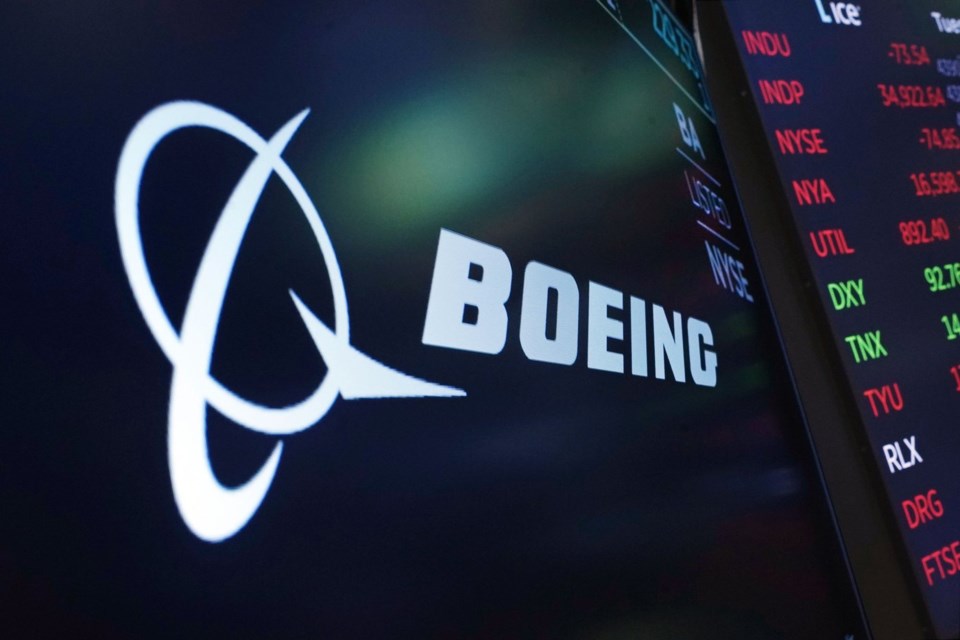MONTREAL — Boeing Co. has pledged $240 million toward a Montreal-area aerospace cluster, anchoring a provincial plan that aims to make Quebec a global launchpad for development of drones and greener aircraft.
The beleaguered plane maker's commitment comprises a big chunk of the $415 million in contributions from the private sector and the province toward an aero "innovation zone" announced at an industry conference on Tuesday.
It also makes good on a portion of Boeing's obligation to pour money into Canada as part of a multibillion-dollar sole-source deal for surveillance planes signed with the federal government last year.
While Boeing's pledge makes up nearly three-quarters of the private sector investments, more than a dozen other companies are also investing in the cluster, centred around three hubs in the Montreal borough of Saint-Laurent as well as the suburbs of Longueuil and Mirabel.
“Quebec is now the only place in the world where the three aviation giants Airbus, Boeing and Bombardier are directly present,” said Premier François Legault in French.
"That says a lot about the quality of our business environment, but also about the talent of the Quebec workforce and the quality of research done here."
The government will inject $85 million in funding to help launch the aerospace hot spot, Legault said.
Boeing's investment includes a $110-million development centre in Saint-Laurent, a $95-million push to grow Boeing subsidiary Wisk Aero as it fledges an electric flying taxi prototype, and a collaboration with landing gear maker Héroux-Devtek.
"This one's a no-brainer," said Boeing Global president Brendan Nelson in an interview at the International Aerospace Innovation Forum on Tuesday, pointing to Montreal's four universities and various colleges with aviation and engineering streams.
Research will focus on everything from engine and plane design for more efficient flights to improved batteries for electric vertical take-off and landing (eVTOL) aircraft — flying taxis — he said, noting the company's 500-plus Canadian suppliers across the country.
Nelson also cited the federal government's selection of Boeing to replace the military's aging patrol planes in a $10.3-billion deal, closing the door on Quebec-based business jet maker Bombardier Inc., which had been pushing for an open bid. Cabinet green-lit in November the purchase of 16 P-8A Poseidon surveillance aircraft from the U.S. manufacturing giant to replace the half-century-old CP-140 Auroras.
"This comes back off the decision made by the Canadian government to purchase the P-8," Nelson noted.
Officials said last year that Boeing signed an agreement to provide business activities and investments in Canada equal to the value of its portion of the contract, which is $5.4 billion.
Despite the pledge and what Industry Minister François-Philippe Champagne called a "home run" in securing Boeing's investment, the company continues to generate anxiety among some Canadian airlines due to production delays set off by the midflight blowout of a door plug in January.
“We must not forget that Boeing comes here to seek our expertise” — not the other way around — said Mehran Ebrahimi, a business professor specializing in aeronautics at the Université du Québec à Montréal.
“Boeing is in an impossible mess,” he said, highlighting safety problems linked to the 737 Max jet.
As part of the announcement Tuesday, Quebec also said it plans to acquire a stake in H55, whose Canadian subsidiary in Longueuil makes electric propulsion systems and works with Pratt & Whitney Canada and CAE Inc. — also contributors to the research and development spelled out at the conference.
Meanwhile in Mirabel, the third cluster of companies will zero in on testing for eVTOLs and drones, officials said.
Other partners include Bombardier Inc., Airbus SE, French electrical systems giant Thales and eVTOL maker Jaunt Air Mobility.
Separately, Airbus announced Tuesday it has signed agreements with Canada's three busiest airports — in Toronto, Vancouver and Montreal — and California-based hydrogen-electric plane developer ZeroAvia to launch a feasibility study for hydrogen storage and fuelling near the tarmac.
"We are very convinced that hydrogen — of course, when produced from renewable electricity — will have an important role to play in our economy, for aviation for sure," said Karine Guenan, who oversees zero-emissions hydrogen projects at Airbus, in an interview.
Canada remains a big global producer of hydrogen, which is generated mainly from natural gas in Alberta. But according to a study by Norwegian research company Rystad Energy, Australia, the United States and Spain are poised to lead the charge on so-called green hydrogen by decade's end.
“We want hydrogen that is cleaner. And if we want to maintain our leadership role in hydrogen production, we have to look at this cleaner way," said XiaoYu Wu, an assistant professor at the University of Waterloo’s mechanical and mechatronics engineering department.
Production from hydroelectric sources, nuclear energy, wind and solar power and fossil fuels using carbon capture are all options, he said.
This report by The Canadian Press was first published May 21, 2024.
Companies in this story: (TSX:BBD.B, TSX:CAE, TSX:HRX)
— With files from Stéphane Blais
Christopher Reynolds, The Canadian Press



